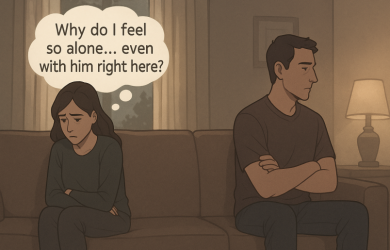Toxic Shame in Marriage: Signs, Causes, and How to Overcome

Unlock Daily 30-Sec Tips for a Happier Relationship
👉 Subscribe FREEKey Takeaways
Marriage.com AI Quick Summary
Toxic shame in marriage can silently destroy intimacy, leaving both partners feeling unseen and unworthy.
Take Sarah and James, for example. Every time they argued, Sarah shut down, convinced she was a failure as a wife. James, feeling rejected, lashed out in frustration. Their conflicts weren’t just minor disagreements—they were driven by deep-seated shame.
Unlike guilt, which stems from a specific action, toxic shame in marriage or partnership makes a person believe they are inherently flawed. It often comes from childhood wounds or past emotional neglect, shaping how partners communicate and connect.
Without intervention, it creates a cycle of blame, withdrawal, and resentment. But by recognizing its presence, couples can break free, foster self-compassion, and rebuild trust in their relationship.
What is toxic shame in marriage?
Toxic shame in marriage is a deeply ingrained belief that one is unworthy of love or connection, often stemming from past emotional wounds. A person who experiences toxic shame in marriage would feel inadequate, insecure, and lacking trust and intimacy.
In relationships, this can manifest as withdrawal, self-sabotage, or harsh criticism, creating a cycle of emotional disconnection. Partners may struggle with feelings of inadequacy, fearing judgment or rejection. Over time, this erodes trust and intimacy.
Recognizing what toxic shame is and its impact on individuals is the first step toward healing, allowing couples to rebuild their bond with self-compassion and open communication.
7 causes of toxic shame in marriage
Research says that toxic shame in marriage often stems from deep-seated experiences that shape how individuals perceive themselves and their worth in relationships.
Here are seven common causes why a person would feel worthless:
1. Childhood trauma
If a child experiences trauma—whether through neglect, abandonment, or verbal abuse—they may develop toxic shame. This feeling of being worthless often carries into adulthood, making them feel inadequate in relationships.
2. Neglect and emotional deprivation
Growing up in an environment where emotional or physical needs are ignored can lead to internalized shame. In marriage, this may result in difficulty expressing their needs. It could also manifest through fear of rejection when seeking comfort and validation.
3. Emotional abuse
Being belittled, manipulated, or criticized repeatedly can create lasting shame. Even in marriage, this past abuse can still haunt the victim. For instance, a spouse who frequently hears, “You’ll never be good enough,” may internalize this belief, leading to withdrawal or self-doubt.
4. Unrealistic expectations
Some individuals grow up believing they must be perfect to be loved. They may feel deeply ashamed if they fail to meet impossible standards in marriage, which often leads to hiding mistakes or suppressing emotions out of fear of disapproval.
5. Mental health conditions
Depression, anxiety, and other mental health challenges can intensify feelings of shame. Someone struggling with these conditions may believe they are unworthy of love, making emotional connections difficult.
6. Cultural and societal pressures
Family expectations, religious beliefs, or societal norms can impose shame, making individuals feel inadequate if they don’t conform. This pressure can cause guilt and insecurity in marriage.
7. Hurtful communication and emotional undermining
Toxic shame in relationships often manifests through sarcastic remarks, public embarrassment, or dismissing a partner’s feelings. Someone who constantly experiences these can develop toxic shame.
These are just some examples of shaming in a relationship. Over time, these patterns destroy self-esteem and trust.
Recognizing these causes is the first step toward healing. By addressing toxic shame in relationships and fostering self-compassion, couples can rebuild trust and emotional safety together.
7 signs of toxic shame in relationships
When considering what toxic shame is, it may be easier to recognize it through behaviors rather than a fixed set of symptoms.
Toxic shame deeply affects how individuals perceive themselves and interact in relationships.
It often leads to emotional withdrawal, low self-esteem, and an inability to express needs. Below are seven key toxic shame symptoms to be aware of:
1. You never get angry
Struggling to express anger can indicate suppressed emotions linked to toxic shame. A person may believe that any criticism or negative remark directed at them is valid, reinforcing their sense of inadequacy.
They may also fear conflict, believing their emotions are unimportant or that expressing them will result in rejection. On the other hand, some individuals react with sudden bursts of anger when shame surfaces, subconsciously trying to reject feelings they’ve spent years avoiding.
2. You have a hard time making decisions
Indecisiveness is a common sign of toxic shame, especially in toxic shame in marriage or long-term relationships. Someone struggling with shame often second-guesses their choices, fearing judgment or failure.
Even small decisions—like picking a restaurant or choosing an outfit—can feel overwhelming. People have been conditioned to believe that their opinions don’t matter or that their reasoning is inherently flawed. Over time, this lack of confidence can lead to passivity and emotional dependence on others.
3. You don’t feel a sense of belonging
A persistent feeling of alienation, even among close friends or family, is a major red flag for toxic shame. It’s tough for people struggling with toxic shame as they often feel like they don’t “fit in” or that something is inherently wrong with them.
They may isolate themselves, avoiding deep connections out of fear that others will eventually reject them. This can create distance in relationships as they struggle to trust their partner’s love and acceptance.
4. You are unsure of who you are
Those suffering from toxic shame in relationships often have difficulty identifying what they want, what they like, dislike, and what they value in life. Since shame teaches people that their authentic self is unworthy, they may mold their identity around pleasing others.
This can result in constantly shifting opinions, avoiding personal expression, or suppressing their actual needs. Over time, this can leave them feeling empty or disconnected from their own identity.
5. You feel worthless
One of the most common and damaging toxic shame symptoms is an overwhelming sense of worthlessness. Individuals may feel undeserving of love, success, or happiness, leading to self-sabotage in their relationships and personal lives.
They may struggle with comparing themselves to others, believing that everyone else is more capable, attractive, or lovable. This can make them vulnerable to toxic dynamics, as they may tolerate mistreatment or settle for less than they deserve.
6. You constantly seek validation
A strong need for external validation is a key sign of shame in a man in a relationship, as well as in women. Those struggling with shame often feel the need to over-explain themselves, seek approval before making decisions, or apologize excessively.
Their self-worth becomes tied to how others perceive them, making them highly sensitive to criticism or perceived rejection. If their partner does not provide constant reassurance, they may spiral into self-doubt and insecurity.
7. You struggle with intimacy and vulnerability
Toxic shame makes it difficult for individuals to open up emotionally, fearing that their true selves are unworthy of love. In toxic shame in marriage, this often manifests as emotional unavailability, difficulty expressing needs, or avoiding deep conversations.
A person may withdraw when their partner tries to connect, not because they don’t care, but because they fear being exposed and judged. This creates emotional distance, making it harder for the relationship to thrive.
Toxic shame silently impacts relationships in profound ways, often without either partner realizing its presence. Recognizing these signs is essential in understanding the depth of their influence and how they shape emotional interactions.
Without addressing these patterns, toxic shame can continue to erode self-esteem and create barriers to true emotional intimacy.
How can toxic shame affect relationships: 5 damaging effects
If you struggle with toxic shame in marriage or a committed relationship, it can profoundly impact how you connect with your partner. Shame often creates emotional barriers, making it difficult to trust, communicate, and build intimacy.
Here are five ways toxic shame can negatively affect relationships:
1. Emotional distance and avoidance
A person dealing with toxic shame may struggle to be emotionally open, fearing that if their partner truly knew them, they would be rejected.
For example, if a wife feels deep-seated shame from childhood, she may avoid sharing personal thoughts and feelings with her husband, leading to emotional disconnection. This avoidance can make the other partner feel unwanted or shut out, weakening the foundation of the relationship.
2. Difficulty handling criticism
Individuals with toxic shame often perceive even gentle feedback as personal attacks. If criticism is used as a weapon in childhood, a person may react defensively in their marriage.
A spouse who says, “I wish you’d help more around the house,” might be met with anger or withdrawal. Their partner internalizes it as “I’m not good enough.” Over time, this can create a toxic cycle where both partners feel unheard and frustrated.
3. Increased anger and resentment
Shame often disguises itself as anger. When inadequacy triggers someone, they may lash out instead of confronting their pain. For example, a husband who was constantly criticized growing up may feel overwhelmed by shame when his wife expresses disappointment.
He may react with frustration instead of addressing his emotions, creating conflict. Many individuals who say, “My husband shames me,“ may be experiencing a dynamic where shame and anger fuel the disconnect.
4. Struggles with intimacy
Toxic shame creates barriers to both emotional and physical intimacy. A person who feels unworthy of love may hesitate to be vulnerable, fearing rejection. This can lead to avoiding affection, suppressing desires, or struggling with sexual connection.
In toxic shame in marriage, this emotional distance often results in a lack of closeness, leaving both partners feeling lonely and unfulfilled.
5. Fear of abandonment and relationship anxiety
Since toxic shame convinces individuals they are unworthy of love, they may develop an intense fear of being abandoned. This can lead to clinginess, constant reassurance-seeking, or even pushing a partner away as a form of self-protection.
For example, someone who was emotionally neglected as a child may assume their spouse will eventually leave them, causing them to sabotage the relationship before that can happen.
Toxic shame quietly undermines relationships, preventing couples from building trust, emotional security, and genuine connection.
How to deal with toxic shame in marriage: 7 tips
Now that you understand what toxic shame is, you may be wondering how to let go of it and rebuild a healthier connection with your partner.
Toxic shame in marriage can be overwhelming, but healing is possible with intentional steps. Overcoming shame requires self-awareness, emotional support, and actionable strategies.
Here are seven ways to begin healing toxic shame and fostering a stronger relationship.
1. Seek professional therapy
Working with a therapist is one of the most effective ways to heal from toxic shame. Therapy helps uncover triggers, challenge negative self-perceptions, and develop healthier thought patterns.
Professionals may use cognitive-behavioral therapy (CBT) or trauma-focused therapy to help reframe how you view yourself and your past experiences.
Additionally, if toxic shame symptoms stem from childhood trauma, therapy can help you process past experiences and rewire negative beliefs. Some people find that couples therapy is also beneficial when shame is affecting their marriage, as it helps both partners understand how shame operates in the relationship.
- Do this: Find a licensed therapist specializing in shame, trauma, or couples therapy. Online or in-person sessions can provide valuable tools for healing.
2. Open up to loved ones
Shame thrives in secrecy. Talking to a trusted friend or family member about your feelings can help bring perspective and validation. Someone who cares about you can offer encouragement and remind you of your worth, counteracting the negative self-talk associated with toxic shame symptoms.
For example, if you have always believed that you are “not good enough,” opening up to someone who sees your true worth can challenge that belief. Being reminded that you are loved and valued, despite your flaws, can be incredibly healing.
- Do this: Identify a supportive person in your life and candidly discuss your struggles with shame.
3. Take mindfulness breaks
When shame feels overwhelming, stepping away from the situation can help you regain control over your emotions. Mindfulness techniques, such as deep breathing, grounding exercises, or meditation, can prevent shame from spiraling into self-criticism.
Mindfulness helps by bringing you into the present moment rather than dwelling on painful memories or imagined failures. It can also help you become aware of how shame manifests in your body—whether through tightness in your chest, tension in your stomach, or feelings of panic—so you can work through those sensations with self-compassion.
- Do this: Practice a simple mindfulness exercise, like focusing on your breath for a few minutes when you feel shame rising.
4. Challenge negative self-talk
People dealing with toxic shame in marriage often have an inner critic that reinforces feelings of unworthiness. Recognizing and challenging these thoughts can help break the cycle of shame. Instead of thinking, “I’m a failure,” reframe it as, “I made a mistake, but I am still worthy of love and respect.”
A powerful way to challenge negative self-talk is by writing down your thoughts and asking yourself, Would I say this to a friend? If not, it’s likely a shame-driven belief that isn’t true. Rewriting those thoughts with kindness can slowly shift your mindset toward self-acceptance.
- Do this: Write down negative thoughts and reframe them with more compassionate and realistic statements.
5. Foster emotional connection in marriage
If you feel distant from your spouse due to shame, intentionally working on emotional intimacy can strengthen your bond. Small daily acts of connection—such as sharing personal thoughts, expressing gratitude, or spending quality time together—help counteract feelings of unworthiness.
Sometimes, toxic shame makes people believe they are “too much” for their partner or that their emotions are a burden. This can lead to emotional shutdowns, making communication difficult. However, vulnerability is essential for connection. Letting your spouse in, even in small ways, can rebuild trust and intimacy.
- Do this: Schedule a daily or weekly check-in with your spouse where you openly share your thoughts and emotions.
6. Set healthy boundaries
If you’ve ever thought, “My husband shames me,” or felt criticized frequently in your relationship, setting boundaries is crucial. Healthy boundaries help prevent interactions that trigger or reinforce toxic shame. They ensure respect and protect your emotional well-being.
For example, if your partner makes comments that trigger shame, setting a boundary like, “I need you to communicate with me in a way that is supportive rather than critical,” can help create a safer emotional environment. Boundaries also involve knowing when to step away from harmful conversations instead of engaging in shame-driven conflict.
- Do this: Identify behaviors that trigger shame and communicate to your spouse what is and isn’t acceptable in your relationship.
7. Practice self-compassion
One of the most powerful ways to work toward healing toxic shame is by treating yourself with kindness and understanding. Shame makes people believe they are unworthy, but self-compassion helps reframe that belief.
Recognizing that mistakes do not define your worth allows you to move forward with greater confidence and emotional resilience.
Self-compassion means recognizing that everyone has flaws and makes mistakes, and that doesn’t make you less valuable as a person. Speaking to yourself in a kind, supportive way—like you would to a friend—can help shift your relationship with yourself and, in turn, your relationship with your spouse.
- Do this: Start a daily self-compassion practice, such as journaling positive affirmations or engaging in activities that bring you joy.
Check out how you can begin your journey to self-love here:
Conclusion
Healing from toxic shame in marriage takes time, patience, and intentional effort. Shame can create emotional barriers, but couples can rebuild trust and intimacy by recognizing its impact and taking steps toward self-awareness.
Seeking therapy, opening up to loved ones, practicing mindfulness, and challenging negative self-talk are essential for breaking free from shame’s grip. Setting boundaries and fostering emotional connection also play a key role in restoring a healthy relationship.
Most importantly, self-compassion is the foundation for lasting change. By addressing toxic shame symptoms, individuals can embrace their worth and create stronger, more fulfilling relationships built on mutual respect and love.
 Tips
Tips
Write your tip or submit a video tip
All tips are reviewed before the publishing.
Share this article on
Want to have a happier, healthier marriage?
If you feel disconnected or frustrated about the state of your marriage but want to avoid separation and/or divorce, the marriage.com course meant for married couples is an excellent resource to help you overcome the most challenging aspects of being married.
Recent Articles
Related Quizzes
Unlock Daily 30-Sec Tips for a Happier, Healthier Relationship
👉 Subscribe FREE on YouTube We'd love your feedback!
We'd love your feedback!
 Expert Q&A
Expert Q&A
Ask your question related to this topic & get the support you deserve from experts.



















 Thanks for your feedback!
Thanks for your feedback!